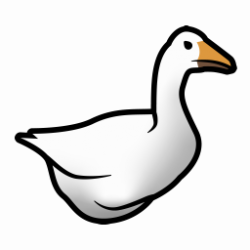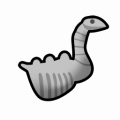Difference between revisions of "Goose"
| Line 59: | Line 59: | ||
An adult goose consumes {{P|Real Hunger Rate}} nutrition per day, and produces {{#vardefineecho:egg_nutr_per_day|{{#expr:{{P|Eggs Per Clutch Average}}/{{P|Egg Laying Interval}}*{{Q|Goose egg (unfert.)|Nutrition}}}}}} nutrition of eggs each day, resulting in a nutrition efficiency of {{#expr:{{#var:egg_nutr_per_day}}/({{P|Base Hunger Rate}}*1.6) round 3}} when unfertilized eggs are eaten. | An adult goose consumes {{P|Real Hunger Rate}} nutrition per day, and produces {{#vardefineecho:egg_nutr_per_day|{{#expr:{{P|Eggs Per Clutch Average}}/{{P|Egg Laying Interval}}*{{Q|Goose egg (unfert.)|Nutrition}}}}}} nutrition of eggs each day, resulting in a nutrition efficiency of {{#expr:{{#var:egg_nutr_per_day}}/({{P|Base Hunger Rate}}*1.6) round 3}} when unfertilized eggs are eaten. | ||
| − | + | For eggs, geese are inferior to [[chicken]]s. Chickens produce 2 half-size chicken eggs for 1 goose egg. Each chicken consumes less nutrition per day. | |
| + | |||
| + | When eggs are allowed to hatch, and slaughtered as babies, chickens become even better for meat. Note that geese produce [[birdskin]] if slaughtered as goslings, but chickens don't produce any leather. | ||
===Meat=== | ===Meat=== | ||
| − | + | When slaughtered, a goose yields {{#vardefineecho:baby_meat|{{Meat Leather Curve|{{#expr:{{P|Body Size}}*0.1*140}}}}}} bird meat as a gosling; {{Meat Leather Curve|{{#expr:{{P|Body Size}}*0.5*140}}}} as a juvenile; or {{Meat Leather Curve|{{#expr:{{P|Body Size}}*140}}}} as an adult. | |
| − | |||
| − | |||
| − | |||
| − | |||
| − | A {{#vardefineecho:femaleratio|{{#expr: 2/3*24*{{P|Egg Laying Interval}}/{{P|Mate Mtb Hours}}}}}}:1 female:male ratio reaches an optimal [[Animals#Mating|fertilization rate]]. With this ratio of geese, you reach a nutrition efficiency of {{%|{{Meat Production|{{PAGENAME}}|Baby|{{#var:femaleratio}}|1 round 2 | + | By slaughtering the geese rather than eating the unhatched [[Goose egg (fert.)|fertilized egg]], more nutrition is gained ({{#expr:{{#var:baby_meat}}*0.05 round 2}} rather than {{Q|Goose egg (fert.)|Nutrition}}). When new-born goslings are slaughtered, an always-fertilized female goose produces {{#expr:{{Meat Production|{{PAGENAME}}|Baby}} round 2}} nutrition per day, resulting in a nutrition efficiency of {{%|{{Meat Production|{{PAGENAME}}|Baby}}/({{P|Base Hunger Rate}}*1.6) round 3}} for the female goose alone. A {{#vardefineecho:femaleratio|{{#expr: 2/3*24*{{P|Egg Laying Interval}}/{{P|Mate Mtb Hours}}}}}}:1 female:male ratio reaches an optimal [[Animals#Mating|fertilization rate]]. With this ratio of geese, you reach a true nutrition efficiency of {{%|{{Meat Production|{{PAGENAME}}|Baby|{{#var:femaleratio}}|1 round 2}}/{{Nutrition Consumption|{{PAGENAME}}|Baby|{{#var:femaleratio}}|1}} round 3}}. |
A goose takes {{#expr:{{P|Juvenile Age}}*60 round 1}} days to become a juvenile, and a total of {{#expr:{{P|Maturity Age}}*60 round 1}} days to reach adulthood. As a gosling grows into adulthood it will consume {{#expr:{{Consumption Upto Adulthood}} round 2}} nutrition in total, and will yield {{#expr:0.05*({{P|Meat Yield}} - {{#var:baby_meat}})}} more nutrition when slaughtered than it would as a baby. This means that the nutrition efficiency of a growing gosling is {{#expr:0.05*({{P|Meat Yield}} - {{#var:baby_meat}})/{{Consumption Upto Adulthood}} round 3}}. | A goose takes {{#expr:{{P|Juvenile Age}}*60 round 1}} days to become a juvenile, and a total of {{#expr:{{P|Maturity Age}}*60 round 1}} days to reach adulthood. As a gosling grows into adulthood it will consume {{#expr:{{Consumption Upto Adulthood}} round 2}} nutrition in total, and will yield {{#expr:0.05*({{P|Meat Yield}} - {{#var:baby_meat}})}} more nutrition when slaughtered than it would as a baby. This means that the nutrition efficiency of a growing gosling is {{#expr:0.05*({{P|Meat Yield}} - {{#var:baby_meat}})/{{Consumption Upto Adulthood}} round 3}}. | ||
Revision as of 06:38, 28 February 2023
Goose
A domesticated bird kept by humans as poultry for it's eggs and meat. Lays eggs very often, however they take a long time to hatch.
Base Stats
- Type
- Animal
- Flammability
- 70%
Pawn Stats
- Move Speed
- 2.3 c/s
- Health Scale
- 40% HP
- Body Size
- 0.6
- Mass - Baby
- 3.6 kg
- Mass - Juvenile
- 18 kg
- Mass - Adult
- 36 kg
- Carrying Capacity
- 45 kg
- Filth Rate
- 6
- Hunger Rate
- 0.45 Nutrition/Day
- Diet
- herbivorous
- Life Expectancy
- 8 years
- Manhunter Chance
- 0%
- Manhunter Chance (Taming)
- 0%
- Trainable Intelligence
- None
- Wildness
- 60%
- Minimum Handling Skill
- 5
- Roam Interval
- 7 days
- Mate Interval
- 8 hours
- Maturity Age
- 0.2 years (12 days)
- Juvenile Age
- 0.12 years (7.2 days)
- Comfortable Temp Range
- -10 °C – 40 °C (14 °F – 104 °F)
Production
- Meat Yield
- 84
 bird meat
bird meat - Leather Yield
- 26
 birdskin
birdskin - Eggs Per Clutch
- 1 to 1
- Egg Laying Interval
- 2 days
- Can Lay Unfertilized Eggs
- true
Melee Combat
- Attack 1
- Feet
3 dmg (Scratch)
4 % AP
1.5 second cooldown - Attack 2
- Beak
5.6 dmg (Bite)
8 % AP
2 second cooldown - Attack 3
- Head
2 dmg (Blunt)
3 % AP
1.5 second cooldown
0.2 chance factor - Average DPS
- 1.27
- tradeTags
- AnimalFarm, AnimalCommon
A Goose is a domesticated, medium-sized waterfowl, known for its large eggs and belligerent nature. Like all farm animals geese cannot be found in the wild, and must be purchased from traders.
Summary
Geese are pen animals. Once tamed, pen animals cannot and do not need to be trained any further. But if left outside of a pen or caravan hitching spot, pen animals will eventually roam outside your colony. Making a caravan is not required to tie animals to a caravan hitching spot.
A female goose produces 1 ostrich egg every 2 days. Geese can lay both unfertilized and fertilized eggs, depending on if it has mated with a male goose.
Analysis
Eggs
An adult goose consumes 0.45 nutrition per day, and produces 0.25 nutrition of eggs each day, resulting in a nutrition efficiency of 0.558 when unfertilized eggs are eaten.
For eggs, geese are inferior to chickens. Chickens produce 2 half-size chicken eggs for 1 goose egg. Each chicken consumes less nutrition per day.
When eggs are allowed to hatch, and slaughtered as babies, chickens become even better for meat. Note that geese produce birdskin if slaughtered as goslings, but chickens don't produce any leather.
Meat
When slaughtered, a goose yields 17 bird meat as a gosling; 42 as a juvenile; or 84 as an adult.
By slaughtering the geese rather than eating the unhatched fertilized egg, more nutrition is gained (0.85 rather than 0.5). When new-born goslings are slaughtered, an always-fertilized female goose produces 0.43 nutrition per day, resulting in a nutrition efficiency of 94.9% for the female goose alone. A 4:1 female:male ratio reaches an optimal fertilization rate. With this ratio of geese, you reach a true nutrition efficiency of 75.9%.
A goose takes 7.2 days to become a juvenile, and a total of 12 days to reach adulthood. As a gosling grows into adulthood it will consume 2.9 nutrition in total, and will yield 3.35 more nutrition when slaughtered than it would as a baby. This means that the nutrition efficiency of a growing gosling is 1.154.
Training
This animal can be trained as follows:
| Guard: | |
|---|---|
| Attack: | |
| Rescue: | |
| Haul: | |
*As of version 1.1.2610, all animals can be tamed. The percentage of likelihood of success depends on factors such as the Animals Wildness Percentage, Pawn Handling Skill, and others. More information can be found on the animals page.
Health
Gallery
Version history
- 1.1.0 - Added as part of the integration of the Vanilla Animals Expanded - Livestock mod into the basegame.




